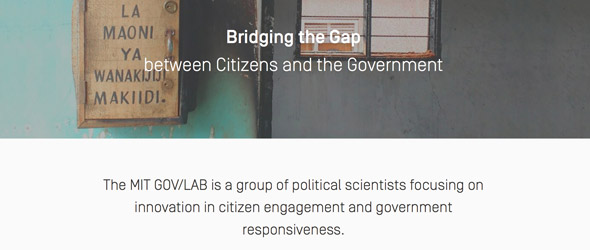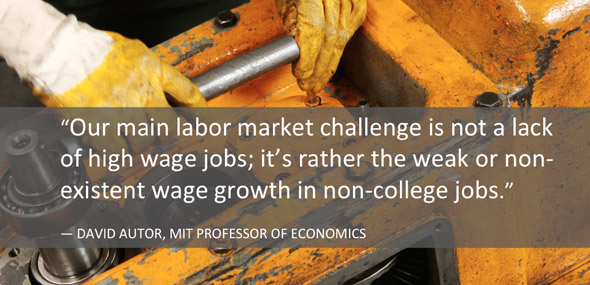Said and Done | In the Media | March 2016
A section of Said and Done
Full March 2016 edition
POLITICAL SCIENCE | FIGHTING THE ZIKA VIRUS
Three lessons from Ebola can help us fight the Zika virus | Lily Tsai
The Washington Post highlights research by MIT political scientist Lily Tsai and the MIT GOV/LAB project. In a project that examined community response to the Ebola outbreak in Monrovia, Liberia, “Tsai and colleagues found that community outreach had a positive impact on citizen cooperation and trust in state authorities.”
Story | Lily Tsai website | MIT GOV/LAB website
ECONOMICS | COMPTON LECTURE
Christine Lagarde: Thinking globally, speaking locally
In her March 3 Compton Lecture at MIT, the IMF managing director called for new technology and policies to reckon with population growth. In a sweeping overview of global demographics and their effects on our civic structures, Lagarde said “The fiscal policy responses and technological innovation are especially important parts of the solution.”
Video | Story at MIT News
DEVELOPMENT ECONOMICS
Ideas on a shelf help no one. Take them to the world.
“Distributing, promoting, and lending continuous support to good ideas for fixing the world's woes is as critical a task as thinking them up in the first place.” Story spotlights successful HIV prevention project developed by Noam Angrist, a former JPAL researcher and student of MIT economist Esther Duflo. The HIV prevention project is based on research by MIT's Pascaline Dupas.
Story at New York Times | Research Page at JPAL
PHILOSOPHY AND CLIMATE CHANGE
Is this who we are? | Sally Haslanger
“I am also impressed by many elements of ‘A Plan for Action on Climate Change’ … I am concerned, however, with some of the reasoning about the significance of divestment and the decision not to create an Ethics Advisory Council. Ethics and social meaning are topics that fall squarely in the humanities, arts, and interpretive social sciences. Might it be worth considering what MIT’s experts in these areas have to offer?”
Commentary: Faculty Newsletter Jan/Feb 2016 | Related: MIT agreement on climate-related action
MUSIC
3Q with Eran Egozy | World-premiere concert that the audience helps perform
Egozy discusses “12,” a chamber music work debuted by the Radius Ensemble on March 5 at MIT. Egozy, who teaches courses in interactive, high-tech music at MIT, performs in Radius and created the digital program used for the audience/smartphone-driven percussion in "12." Egozy is the co-founder and former chief technology officer of Harmonix.
Story at MIT News | Egozy webpage at MIT Music

The Radius Ensemble; Eran Egozy at right
HISTORY
Harvard drawn into race battle at U.S. universities | Craig Wilder
In an article on campus debates about racially-charged language, MIT historian Craig Wilder explains that “the continuing conversation about the legacy of slavery on campus has been stirred by the current activism of students — in part inspired by the Black Lives Matter movement — and not by the institutions themselves.”
Story at the BBC | Wilder webpage
MIT PHI BETA KAPPA
MIT Chapter to welcome Visiting Scholar Mae Ngai in April
The MIT campus chapter will be hosting a PBK Visiting Scholar, Professor Mae Ngai in the History Department at Columbia University, on April 6-7. Professor Ngai will give a public lecture, "The Chinese Question and Global Politics in the Nineteenth Century" at 5pm on April 6.
More information at PBK
HISTORY
Why we love dogs and cats but not bats or rats | Harriet Ritvo
“In the United States and Britain,” MIT historical Harriet Ritvo finds, “pets have become commonplace only in the past two centuries, a powerful argument for culture as a driving force.”
Story at the Washington Post
COMMUNICATIONS FORUM
Podcast and summary: Is there a future for in-depth science journalism?
Traditional media outlets have been facing budget cuts and layoffs for years, with specialized reporters often among the first to go. Yet last year, Boston Globe Media Partners made a significant investment in launching STAT, a new publication that focuses on health, medicine, and scientific discovery. STAT‘s leadership and reporting team discuss how the field of science journalism is changing. Moderated by MIT Associate Professor of Science Writing Seth Mnookin.
Podcast + Summary | Communications Forum
INTERNATIONAL STUDIES
Bustani Middle East Seminar celebrates 30 years | Lecture on March 15
Funded by Myrna Bustani in memory of her father, Emile M. Bustani '33, the seminar is hosting two public lectures in March.
Story
HISTORY
The real story behind Donald Trump’s slander | Christopher Capozzola
“Yes, there were deliberate efforts to offend Muslim Filipinos’ religious sensibilities,” Capozzola told Time. “And yes, there was large-scale violence against their communities. But I know of no event like the one that Mr. Trump describes.”
Story at Time magazine
POLITICAL SCIENCE | PEACE IN THE MIDDLE EAST
Does peace in Syria stand a chance? | Fotini Christia
In an article on the opportunities and challenges to a lasting peace in Syria, MIT political scientist Fotini Christia is cited for her analysis of internecine conflict in politically unstable areas of the world.
Story
SECURITY STUDIES PROGRAM | HOMEGROWN TERRORISM
Experts warn the largest U.S. threat is homegrown | Jim Walsh
The Boston Herald explores the risks of a "dirty bomb" attack by ISIS on US soil. “This is something you’re going to see used in Iraq or Syria,” explains MIT analyst Jim Walsh. “If you transport it to the U.S. your chances of getting caught shoot up.”
Story
POLITICAL SCIENCE | ELECTORATE
Political polarization? It’s not just in Washington | Christopher Warshaw and Devin Caughey
The Boston Globe reports on a new study co-authored by MIT political scientists Christopher Warshaw and Devin Caughey, who revealed the ways the political orientations of all 50 states have shifted between 1936 and 2014.
Story
COMPARATIVE MEDIA STUDIES
Facebook and the New Colonialism | Ethan Zuckerman
An article at The Atlantic on the the colonialist echoes of Facebook’s “Free Basics” program includes a quote from MIT media theorist Ethan Zuckerman, "The solution conveniently helps lock in Facebook as the dominant platform for the future at a moment when growth in developed markets is slowing.”
Story
ECONOMICS
Bernie Sanders’s Tax Plan Would Test an Economic Hypothesis | Peter Diamond
An analysis of Presidential candidate Bernie Sanders’s tax proposals at the New York Times cites recent research co-authored by MIT economist Peter Diamond on the maximum efficiency of tax rates.
Commentary at New York Times
ECONOMICS AND AMERICAN JOBS
The recovery is generating more high-wage jobs — but does that matter? | David Autor
Research by MIT economist David Autor is cited in an article on the pace of the U.S. economic recovery and the quality of jobs available.
Story at the Washington Post
COMPARATIVE MEDIA STUDIES | GAME LAB
The Intersection of Learning and Fun: Gamification in Education
Video games might be the future of education, according to an article at the Forbes website that includes research by Eric Klopfer, Scot Osterweil and Katie Salen at the MIT Game Lab.
Story at Forbes
ANTHROPOLOGY
The Future of Anthropology | Heather Paxson, Stefan Helmreich
BBC 4 radio show Friday, featured as voices speaking about the future of anthropology
Story at BBC 4 Radio
SCIENCE, TECHNOLOGY, AND SOCIETY
Sherry Turkle's books featured in New York Review of Books essay
Turkle's books, Alone Together and Reclaiming Conversation, are featured in a lengthy essay review in the 25 Feb 2016 issue of the New York Review of Books.
Review
ECONOMICS
Annuities as an Alternative to Shaky Markets? Not So Fast | James Poterba
The New York Times explores the benefits and dangers of annuities, citing retirement savings research by MIT economist James Poterba.
Story at New York Times

